“Serendipity” on LitBowl, Hummingbirds, and Baby Bunnies
- At May 20, 2024
- By Jeannine Gailey
- In Blog
 1
1
Hummingbirds and Baby Bunnies
Though spring and summer seem a little confused lately (Two days at over 80 degrees, then a fifty degree day with cold rain) I swear we are in the late spring/early summer phase, which means lots of birds, and the occasional baby: goslings, ducklings, ospreys learning to fly and baby bunnies.
This week was supposed to be full of medical appointments but was too sick, ironically, to attend, so I had time at home to take pictures and read some of the books that have been accumulating in my room. (Earthlings by Sayaka Murata, Brother and Sister Enter a Forest by Richard Mirabella, among others.)
Last week I was saying I didn’t feel much like a writer, but then I got an acceptance and a handful of rejections (editors clearing their desks for summer), wrote a few poems, and sent out one or two submissions, so I guess that didn’t last too long. That’s usually how it is—I might have a slow period where nothing happens, then I’ll get inspired by something and get going. This week at our Bookwalter’s Winery book club we’ll be discussing the fascinating book, The Husbands: a Novel by Holly Gramazio, which I really loved and am looking forward to seeing what other people thought about it!
- Immature rufous hummer in midair
- hummer with fuchsias
- hummer at feeder
 A Poem from Flare, Corona featured on LitBowl
A Poem from Flare, Corona featured on LitBowl
This week I was lucky enough to have a poem from Flare, Corona go mildly (?) viral on social media when it was featured by LitBowl, which puts up poems on Instagram and other social media. The poem was “Serendipity.” Here it is if you want to read it yourself. Things like this can help sell books, which is nice around the book’s one-year birthday. Thanks, LitBowl!
Life news has seemed even more apocalyptic than usual these days, so if you, like me, need a break, reading poetry and short stories can help.
If you decide you want a copy for yourself, you can order it here: Flare, Corona
The Aurora (or FireFoxes in the Sky), Signs of Summer Already Here, and How Sometimes I Don’t Feel Like a Writer
- At May 13, 2024
- By Jeannine Gailey
- In Blog
 1
1
 The Aurora (or FireFoxes in the Sky)
The Aurora (or FireFoxes in the Sky)
Awe-inspiring? Yes? I finally understand the big deal about the Northern Lights! Why so many myths. The Ainu people of Japan believed a child conceived under the Northern Lights would have a particularly lucky life. One Finnish myth involves Firefoxes running so fast they left sparks in the sky. Vikings believed in the reflection of the shields of the Valkyrie. I understood, when I saw what looked like an opening in heaven with streams reaching down to earth, why people believe in aliens or gods, or like some of the Alaskan peoples, the spirits of whales and seals in the sky. It was unlike anything I’d ever experienced just out on my back porch, watching all these lights move around, snapping pics with my cameras (our eyes are capable of seeing less of the color of the Northern lights than even a cellphone camera!) There were people out there walking on our street, all looking up at the sky and snapping pictures, and I felt that community, you know, the feeling of being together experiencing something beautiful.
- Northern Lights, my backyard in Woodinvile
- Aurora
- More magical iights
Signs of Summer
The last couple days have been in the eighties and the wildfires have already started in Canada. Also, two sure harbingers of summertime here—my birds, the goldfinches and black-headed grosbeaks.
Unfortunately, along with the warm weather came some troubling health symptoms returning—unexplained fevers and hives, for instance. More MS symptoms, which is typical with the heat, I know to expect it. I am looking forward to working more on my next book manuscript in June at my writing retreat.
- Pair of goldfinches
- Black-headed grosbeak
- Goldfinches
Sometimes I Don’t Feel Like a Writer
I’ll be honest. I haven’t been writing or submitting much lately. My latest book project is mostly done (I need to do some pruning…) and I haven’t had the inspiration to start a new one yet. If you go so many days without writing a poem or thinking about poetry, you can start to…not feel like a writer. I mean, I’ve been writing poems since grade school, I’ve been publishing stuff since I was a teenager, but even so, sometimes other things in my life—like being sick—take up all my time and energy, and all I have the mental energy to do is maybe watch a movie I’ve seen before or listen to an audiobook. I’ve also been doing some spring cleaning—eliminating things, mostly—which is exhausting. Is this MS, or midlife, or the fact that I’ve been sick for over a month with a mystery illness the doctors can’t seem to figure out or treat while I go to appointments and get blood drawn and get MRIs. Ugh. I have hope that the writing residency upcoming in June will give me a boost, but honestly, I’m just feeling disconnected from the writing world—which let’s face it, has had a lot of ugliness in it lately—and even from poetry. It’s been a while since I read a poetry book that I was like, “Wow!” about. Once again, sometimes it’s hard for me to distinguish what’s happening physically to my body (pain, hives, weakness, fatigue, etc) and what’s going on emotionally and mentally. Usually, like Taylor Swift sings, “I’m so productive…it’s an art” but not lately. I was trying to find paid work for a while (we still haven’t gotten our ADA bathroom remodel started due to lack of funds) which maybe was a bit dispiriting. I feel old and unwanted and like the current batch of editors at lit mags are not even interested in the kind of thing I write anyway, so why send anything out? This is not a pity party, but I wonder if anyone else is feeling this kind of disconnect from writing and the writing world? Is this part of getting older? Or part of being sick? I can’t tell!
Still, it’s exciting to see ducklings on my daily walk (when I’m up for one of those) or see something as spectacular as the Northern Lights. I still feel happy with most of my life, honestly, I just feel annoyed that my health problems take up so much time and money and energy, and keep me from doing anything I actually want to do. And the fact that summer—with its heat (and MS symptoms) and wildfires (allergy and asthma symptoms) is coming, I know it’s not my best season, despite the proliferation of summer flowers and blue skies.
What do you do when you don’t feel like a writer? Comments welcome!
May Arrives with Lilacs and Hummingbirds, Art Show Reports, Birthdays, and Down Days
- At May 06, 2024
- By Jeannine Gailey
- In Blog
 1
1
 May Arrives with Lilacs and Hummingbirds
May Arrives with Lilacs and Hummingbirds
May is here, and with it, hummingbirds and lilacs, though it still feels like winter—today we barely got up to fifty degrees, and a cold rain fell all day. I’m feeling a little down—I got sick with a stomach flu after my birthday, and the bad weather (along with the news) has increased my overall blues. I have said here before that I am a cautious optimist—but some days it’s harder than others. Still, despite the cold, the first black-headed grosbeak appeared on my back porch (no picture, sorry) and goslings and ducklings have appeared along the lakes and rivers. Also, Woodinville has had cougar sightings! Not in our yard, but nearby.
Birthdays and Down Days
For my birthday, we had a little gathering with just Glenn and my little brother Mike and his wife Loree, and we chatted and celebrated. We took some pictures and had gluten-free black forest cake and mostly talked about lighter subjects. The day was relaxing and nice—Glenn and I took advantage of a brief window of sunshine and walked around Woodinville, got a glass of rose at a winery, then home to dinner. But the next day I woke up with the worst stomach flu (including a fever, no one else got sick, so just a weird virus?) I’ve had in years. The next two days, I stayed mostly in bed, feeling down, and a little discouraged about—well, maybe this is a midlife birthday cliché—where I am, what I’ve accomplished (or not). I remember pretty well when my mother turned 51—she was still working 90-hour work weeks, traveling all the time—and when I think about what I thought I’d accomplish by the same age, I just don’t know if I measure up against my own expectations.
Maybe this is a problem of being chronically ill and disabled—neither of which I’ve had a choice about, of course—or also a problem of being labeled “gifted” at a young age, having high expectations about what you were expected to do with your life. Heck, even Barbie was President. I’d meant to go to med school, and when my health got in the way, I veered to corporate work—and when my health got in the way of that, I veered again, to writing full-time (among other ventures). And writing, though I’ve published six books (eight, if you count non-fiction books), has definitely felt like less than a triumphant path. Maybe it feels like that for everybody, although I know people who experienced a lot of wins early in their careers, so who knows? Sometimes I feel like a lab mouse in a very specific maze I haven’t quite figured out, but I keep getting shocks instead of treats. On the other hand, still alive? So, that’s a win.
- Birthday winery visit
- Mike, Loree, me and Glenn
- birthday, out in the garden
Art Gallery Reception Reports – “Spectacle du Petit” at Roq la Rue
I finally felt well enough to leave the house yesterday for the opening reception for “Spectacle du Petit”—a group show of tiny works by many artists I like, including Dewi Plass, Josie Morway, and John Brophy. It was fun, I got to meet a couple of the artists, and I always enjoy the people watching at Roq La Rue’s parties—you’ll inevitably get served “looks” that are very specifically Seattle. If you live around here, you should really catch the show too—a lot of the works are affordable because they’re smaller, which is great because most of us don’t live in huge houses anyway.
I feel lucky as a writer to have wonderful places to see art like Roq La Rue and have a little bit of inspiration, especially during a dreary week. Ghost dogs and red squirrels hugging hummingbirds for everyone!
- Me posing with Dewi Plass pieces and ghost dogs
- Jose Morway piece
- John Brophy
Do People Buy Books? Followers and Publishing, Plus a Reading and Class Visit Reports, Typewriters, Art Birthdays, and More
- At April 28, 2024
- By Jeannine Gailey
- In Blog
 4
4
Do People Buy Books? And Followers and Publishing, Thoughts on Two Threads on Social Media This Week
The end of National Poetry Month, and of course, I celebrate my birthday on the very last day of April. The news has been tumultuous lately, as has my personal life (MS flareups and a family member in the hospital this week, among other things), so it’s hard to for me sometimes to sort through the noise on social media to pick up on interesting or pertinent threads. But these two stuck out to me:
First, there was an article “No One Buys Books” (with a rather negative tone, but a lot of useful numbers to people interested in book publishing and PR), and in a separate conversation, a friend of mine posted how a press had turned down her non-fiction book because they preferred “writers with 100,000 followers” (on what platform? no idea!) Both of these conversations seemed to cause a lot of angst and even despair, so I’m just going to do a little counterpoint to both right here. Listen: I watch a lot of film noir, I haven’t had an easy or charmed life (just check out my blog from the past ten years to see what I mean,) and I’m just as cynical as the next person when it comes to publishing industry, and I have my dark days, but…
- Probably no one is publishing you – or not publishing you – because of your social media following. I mean, will it hurt you to have a solid social media following? Probably not. But it doesn’t guarantee you anything either. Are our followers even buying our books? That’s a very good question. Maybe you’re fun to follow on social media but your followers are not poetry fans. So, maybe, but maybe not. It’s not worth stressing out over. I mean, yes, if you want to be a successful writer (however one defines that,) put up a decent web site, get on Instagram or Facebook or Twitter or whatever you want, and is it bad to be entertaining and insightful and talk about books (sometimes your own, sometimes others’?) No.
- Yes, some people are still buying books – I buy books, my brother in tech buys books, my parents buy books, my friends buy books. I often buy people books as gifts. I receive books as gifts. So, are most book sales the Bible or Harry Potter or LOTR, as the article said? Maybe so. But I have had friends on the NYT bestseller lists. (Not poetry books, but they were poets!) I know plenty of us poets who have sold 1000 copies of their books (or over.) So it’s not some impossible dream. (Listen, this is why I wrote PR for Poets – so poets could sell more than the 50-100 books that might be the norm for most books. I didn’t write it to waste your time, or mine. Most of it is not lies. Basic PR and marketing – even if you have to do DIY – still works, maybe not as well or as fast as it used to, but that’s no reason to say “no one buys books” or “publishing a book is not worth your time.”
- Pessimism isn’t always useful, and I know this, because I’m a half-pessimist myself. Optimism is much better at increasing your chances of winning – your chances of doing the things you want to do, and accomplishing what you want to accomplish. No one is looking at the bright side right now – the upcoming election, the Bird flu, the Middle East, Russia – and I understand why. But guess what? Yes colleges are closing because they lack financial stability, yes, book publishing as a business is very poorly run right now by people who are looking at profit not promise, yes, people read less than they used to. And things are expensive right now – that might be slowing books sales as well. But none of this is a reason to throw up your hands, and sigh, and give up. I haven’t and I’m just a poet. So, that’s my two cents.
Reading and Class Visit Reports
So, this week was pretty eventful for me poetry-activity wise. First, a reading with some Jack Straw alums in downtown Seattle, which went great—I loved seeing friends and hearing the other writers—and not-so-great—my MS was really acting up, leading to me losing balance in the middle of the reading and having problems with breathing. You can see the whole reading below—I’m the first reader—and see the trouble I was having (and also hear some poems from Flare, Corona you might not have heard before).
Then I had a class visit I was invited to, which went great—except that part of the class was missing because of campus things, students feeling threatened or scared to be on campus because of protests and students participating in protests. Besides that, the conversation was great, the questions asked by the students were intelligent, and the professor who invited me was wonderful. I wonder right now, with colleges shutting down left and right and the scary stuff on the news about students being attacked and/or arrested, what I would do if I were an in-person professor right now instead of a home-based freelance writer and editor. It definitely seems more stressful now that it did when I was getting my degrees, or when I was adjunct teaching. Anyway, I hope the talk was useful to the students, because writers, as I’ve mentioned, are in an anxious moment in many ways.
Typewriters, Art, Birthdays, and More
So, a little early birthday celebration involved art—a beautiful art book Glenn got me of Frida Kahlo, her complete paintings and illustrated journal pages and photographs of her throughout her life, big and glossy (and twelve pounds! almost too heavy for me to lift!)—a framed print that Dewi Plass made for me of her painting, “Dreaming of Dragons” (which she had already sold, but she ran a limited edition for me! You can see her handwriting her on the print in pencil).
Here it is below:
Some birthdays (like last year) involve big parties, but this one was quiet, which was fine given my health stuff, and involves art and my little brother (who I haven’t seen in a while) coming over for dinner. Speaking of art, I’m thinking of making some stationary with my typewriter art photos, like the one at the top of the post. Is this something you’d be interested in? Anyone have any good ideas about finding a good place to make custom stationary with photographs? I might have to start at Etsy shop! LOL. The last refuge of the creative?
On the last day of April, I hope for some modest fun – my brother over for dinner, a visit to the local bookstore and Paper Source, maybe, if the weather’s good, a walk around to look at everything that’s blooming (wisteria! lilac!) that I haven’t been out to see because mostly it’s been rainy and cold. I want to get back to some writing, too, since it feels like I haven’t been doing it enough. Too much bad news, not enough writing – not a good state for the soul. Looking at art, spending time in the garden, with friends and family – I know those things help, at least they help me. I wish you a happy ending to National Poetry Month, to April, and wishing you some peace instead of anxiety, some inspiration instead of discouragement, love and kindness instead of injustice and meanness. I wish you lilacs in your path.
Last Days of 50, Catching Up on Pop Culture, Reading This Week in Seattle, Tulip Festivals, Risk vs Reward and Knowing Your Limits
- At April 22, 2024
- By Jeannine Gailey
- In Blog
 0
0
 Last Days of 50
Last Days of 50
It’s about a week until my 51st birthday, so these are the last days of being 50! Glenn took me up to the tulip festival a few days ago to celebrate, hence some beautiful pictures of tulips, on days when we surprisingly had really nice weather—sunny, windy, not too hot. I have been feeling my age—or maybe it’s an upper respiratory infection I’ve been fighting for two weeks, MS, or my anemia—anyway, I haven’t had much get up and go, honestly. It doesn’t seem very rock-n-roll.
Being a little down—with the addition of some car travel time—allowed me to consume some modern culture. I listened to Beyonce’s new “country” album—though I would call it more a mashup of country, folk, gospel, and blues, and hey, I loved listening to it (and actually hearing Beyonce’s voice for a change—it’s a surprise to hear her voice mixed so that you can actually hear with warm timbre). And of course, listened to Taylor’s The Tortured Poetry Department Anthology—only really loved one or two of the songs, like “Florida” and “Clara Bow,” unlike the way I instantly loved Evermore. Also, I was expecting more poets to show up in her album! I also watched the new Dune part II, which while something of a spectacle, had very strange pacing—a problem with the first Dune as well. Now, I’d love to see David Lynch’s original five hour cut that never got aired years ago. The whole book (and movie) is a pretty straight- up metaphor for countries battling over oil in the Middle East, along with a strong critique of religions in general. Of course, it was written in the seventies, and those themes were everywhere then.
- Seated with tulips
- Glenn and I tuliping
- Mt Baker over tulips
Reading This Week in Seattle with Jack Straw Alumni
In a rare real-life appearance this week, I’m reading with the Jack Straw alumni in downtown Seattle Wednesday night at 7 PM at the Jack Straw Cultural Center. I’m only reading for about ten minutes, but my book will be there so if you haven’t gotten a signed copy from me yet, this is a good chance! I’m also doing an online appearance the next day for a class, which should be fun. I just need some energy back!
Tulips and Risk vs Reward
As I said, I’ve been feeling a little under the weather but Glenn took me for my birthday up to the Skagit Valley Tulip Festival. Afterwards I couldn’t make my legs work for a while (an MS thing—when you push yourself, stuff stops working) and I was exhausted, but today I was so happy I experienced the beauty and the sunshine and the positive experiences interacting with people and the art show (women artists on forests) at the Museum of Northwest Art and seeing all the flowers and one field of scented tulips (?) and the hyacinths and apple trees and yes, the pictures are wonderful and fun to take, but sometimes it pays to take a little risk—in my case, making my MS symptoms a little worse—to experience something that makes you happy and your life better. Risk vs reward, another lesson?
As I get older, I need to learn to practice self-care, acknowledge my limits, and also, when to take a shot at something that might be a little bit hard. It’s hard to know the exact right balance. If any of you have all the answers, let me know. Anyway, I think I will enjoy feeling like a real poet again this week.
- Red tulip field, Mt Baker
- Glenn and me with sun flare and tulip and hyacinths
- Cherry blossoms with moon


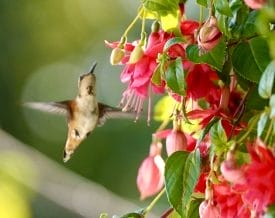
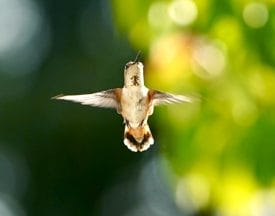
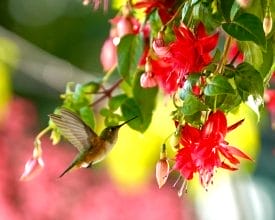






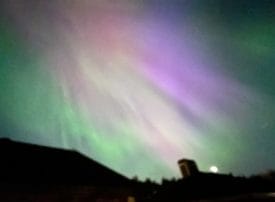







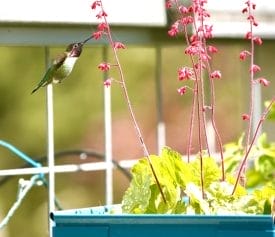

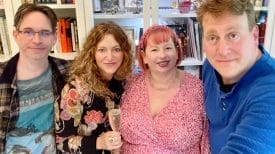




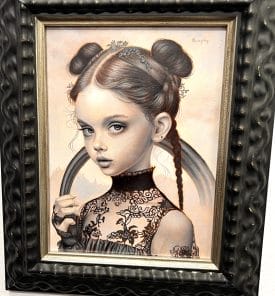


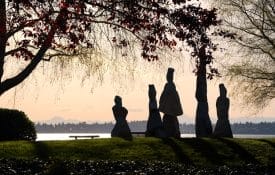
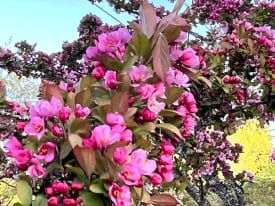









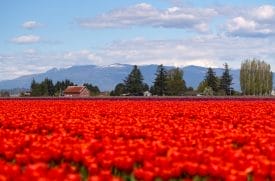


 Jeannine Hall Gailey served as the second Poet Laureate of Redmond, Washington and the author of Becoming the Villainess, She Returns to the Floating World, Unexplained Fevers, The Robot Scientist’s Daughter, and winner of the Moon City Press Book Prize and SFPA’s Elgin Award, Field Guide to the End of the World. Her latest, Flare, Corona from BOA Editions, was a finalist for the Washington State Book Award. She’s also the author of PR for Poets, a Guidebook to Publicity and Marketing. Her work has been featured on NPR’s The Writer’s Almanac, Verse Daily and The Year’s Best Fantasy and Horror. Her poems have appeared in The American Poetry Review, Poetry, and JAMA.
Jeannine Hall Gailey served as the second Poet Laureate of Redmond, Washington and the author of Becoming the Villainess, She Returns to the Floating World, Unexplained Fevers, The Robot Scientist’s Daughter, and winner of the Moon City Press Book Prize and SFPA’s Elgin Award, Field Guide to the End of the World. Her latest, Flare, Corona from BOA Editions, was a finalist for the Washington State Book Award. She’s also the author of PR for Poets, a Guidebook to Publicity and Marketing. Her work has been featured on NPR’s The Writer’s Almanac, Verse Daily and The Year’s Best Fantasy and Horror. Her poems have appeared in The American Poetry Review, Poetry, and JAMA.






